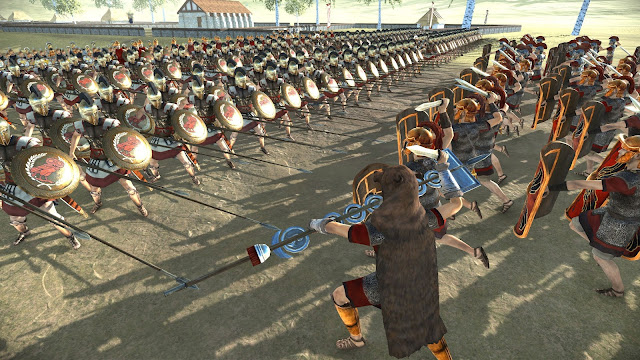Total War: Rome Remastered Review
The camera pans across a poised army as my boisterous general gives a fiery speech about honor and victory, and I'm transported back to the virtual battlefields of a time long past: 2004. Total War: Rome Remastered is a very faithful recreation of the series' first fully 3D expedition, originally known as Rome: Total War, with some modest but notable graphical and UI updates. But as astounding as it was at the time, the aging gameplay hasn’t gotten the same attention, and doesn't hold up all that well compared to its successors as a result.
The most obvious upgrades in Total War: Rome Remastered are visual. In fact, Creative Assembly insists that the engine running underneath is essentially unchanged, so everything from spies on the campaign map to a unit of Triarii on the fields of Italy should behave more or less just as it would if you fished your old CD-ROMs out of whatever box they're wedged in. And no doubt, it's an impressive face lift – especially when it comes to lighting and terrain details. The units, though, don't quite hold up to the level of fidelity we're used to in modern Total War or even 2013's Total War: Rome 2, which is itself almost eight years old by now.
And that's kind of a running theme with this remaster: they made an old game feel less old, but they certainly didn't make it feel new again.
Rome: Total War was ahead of its time in so many ways when it came out, and all of those great ideas are still here. Dividing Rome itself up into three factions that are set off in three different directions to conquer, before ultimately meeting each other in a bloody civil war at the end, was a fantastically effective way to keep the late game challenging and interesting with fairly simple, transparent mechanics. There are even a couple things in here I think the original Rome did better than the games that came after it, like having to physically send a diplomat across the map to treat with other factions. It adds just a bit of extra immersion and sense of place if you can't ring Mithridates up on the phone to offer a trade deal.
But in most other ways, it's simply fallen too far behind the times. Strategy games in general, and Total War specifically, have evolved so much in the last 18 years that going back to the original Rome can be deflating. The AI is one of the primary culprits. If you're coming from Total War: Three Kingdoms or Total War: Warhammer 2, the various Gauls, Greeks, and Carthaginians you'll match wits against here won't feel like much of a match at all. It's relatively easy to beat entire armies just by microing your cavalry well, for example. The enemy tends to play very passive and can easily be lured into Cannae-like traps over and over again. It felt like going back in time as an adult to beat up on my middle school bully.
The included Barbarian Invasion expansion was incredible in its day, but within the first handful of turns revisiting it, I was struck by the fact that it's basically a more primitive version of the excellent Total War: Attila, and I'd really rather be playing that. The fact that the map is smaller and there are fewer factions isn't necessarily the issue. In some ways, Total War actually works better with this reduced scope. But it's missing so many years of iteration and refinement of the formula that I wondered if it wouldn't have been worth including some more substantial, gameplay-related quality of life changes. A less obtuse public order system or a way to see at a glance how many men a unit needs to be back to full strength would have been nice.



Nhận xét
Đăng nhận xét